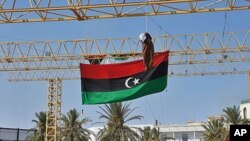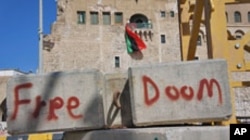Thursday marks 42 years since Libya's Moammar Gadhafi seized power in a coup. It's an anniversary that until now was observed with great fanfare. VOA's Elizabeth Arrott attended the lavish 40th anniversary celebrations two years ago and now is back in Tripoli for what would have been Gadhafi's big day.
When Gadhafi marked 40 years, he put his picture everywhere - images of him as a brash young army officer, the self-styled philosopher, the king of all African kings.
Today, those posters are still here, only they are on the street, stepped and stomped on by the people he once led.
Back in 2009, there were fireworks. Now, tracer bullets light the sky of a Tripoli in blackout.
Overlooking Tripoli's harbor is Martyrs' Square. Back then it was Green Square, and headquarters for Gadhafi's massive party for himself. Now, bullet casings litter the ground, and an effigy of the former leader swings from a scaffold above.
One of the biggest changes is that people like Mohammad Toumi are able to speak out.
The Tripoli resident excused himself for the language he used, but said the past 42 years were "crap."
The eternal revolutionary, as Gadhafi was known, had become an emperor with no clothes, no match for a new generation seeking change, and a world which, for the most part, wanted to see him gone.
Hints of Gadhafi's growing isolation could be seen back then. He invited just about everyone, but it was mainly other African leaders, including fellow war crimes suspect Omar Bashir of Sudan, who came.
During the 40th anniversary celebrations, the Libyan leader did little to hide his autocratic demeanor, slapping his protocol minister in public, as well as his translator. He had state journalists proclaim him "the man who impresses me!" - all the while protected by his phalanx of female bodyguards.
But the power he amassed was not enough to protect him from uprisings sweeping the Arab world.
Some here say the revolution could not have happened without Libya's youth. Salem Nawar, who is in his sixties, believes his generation became accustomed to Gadhafi's oppression.
"These youngsters, they've heard their elders, they've seen their friends being badly treated, and they came out, nobody asked them to come out. Nobody asked them, they are going to pay them or do this, okay, a lot of them, they think it is fun, but they paid dearly."
Nearby, two young men linger at the edge of the square, where two years ago Africa's leaders came to wish Gadhafi well. One wears a T-shirt with a "Wanted" poster for Moammar Gadhafi. His message to the former "Brother-Leader" is blunt.
"I hate you and I think you go to the [hell]fire," he said.
It's a message that two years ago was unimaginable on the streets of Tripoli.





